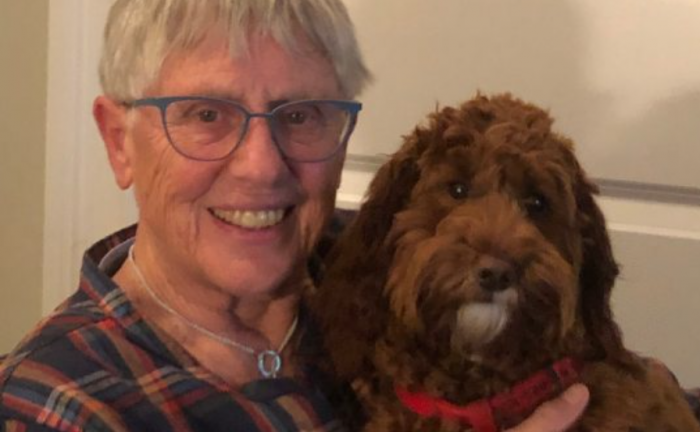A couple of years ago, I made the excruciating decision to put down my 15-year-old cockapoo.
Maggie had little interest in food and was losing weight. She occasionally barked at her dish or stood in corners staring at the wall. She trembled off and on for no discernible reason.
My vet suggested that she had become demented. I sensed he was right. Still, deciding when was the right time to help her die was excruciating.
A friend referred me to a vet who made house calls; she fondly referred to her as “the angel of death.” Making that phone call, setting a time and day for an appointment, and then inviting her into my living room were some of the most difficult moments of my life.
How do you welcome the person who will euthanize your pet, even when you know it’s the kindest thing to do? It helped when I remembered that the day before the vet came, Maggie climbed on top of me in the middle of the night. She was trembling uncontrollably, and my hands offered her no comfort or reassurance. I still weep, recalling those moments.
I often hear this question from people in my bereavement groups: “Why do I feel more intense grief over my dog (or pet) than I do for humans who have died?” When they ask, you can feel a hesitancy and timidity in their voice, an overlay of embarrassment or shame. And invariably, you can feel a sigh of relief when another person in the room acknowledges they, too, have lost a pet and have been there, too.
There are many reasons why the death of a pet may be such a profound experience of loss. Perhaps you have lost your closest companion and the only source of unconditional love you have ever known. You’ve lost a being that was present or witness to some of your most significant life transitions. Your pet’s life held some of your dearest memories.
For many of us, pets anchor our daily routines. When a pet is gone, you may stop taking customary walks that for years offered unexpected encounters and welcome conversations with neighbors. You feel untethered. In a New York Times article a couple of years ago, writer Jen Miller wrote after the death of her dog, “She was the metronome to my life.”
Self-care is especially important in the weeks and months after losing a beloved pet. Our culture doesn’t include rituals, obituaries, or public ways of sharing sorrow for an animal’s death. And because many people can’t understand the grief you feel, they may comment, “It was only a dog,” and inadvertently dismiss or hurt your feelings.
This is a time to treat your self with great kindness. Your grief—the grief that is yours and yours alone—will take whatever time you need. Allow yourself to fully feel your sorrow, and don’t let anyone tell you what your grief should look like or how long it should last. No one knows more about your grief and what you need than you do. Tend to your pain and love with deep care and reverence.
Use care in choosing people with whom you share your grief. People who have deep connections to their pets will probably understand what you are going through. You may feel a special bond with friends or family members who have lost their companions.
Consider creating a ritual that honors the relationship you had with your pet. Invite friends to join you and share in ways that will feel comforting to you.
Look for ways to memorialize your loss. You might plant a tree or bush, bury your pet’s ashes, make a donation in honor of your pet, or create an altar where you place photographs, your pet’s favorite toy, a leash, collar, or tags.
Recognize that grief is exhausting, so be sure to get enough sleep. As you take good care of yourself, also reach out to your loved ones. If the pet was a family pet, everyone is hurting, even the other pets in your home.
Above all, try to remember that your grief is normal and natural and a rich expression of your love.
These are some of my favorite poems and books that I hope will offer you comfort.
Poems
“For Grief” by John O’Donohue
“The Guest House” by Rumi
“Death of a Dog” by Ted Kooser
“Talking to Grief” by Denise Levertov
“Kindness” by Naomi Shihab Nye
Books
The Pet Loss Companion: Healing Advice From Family Therapists Who Lead Pet Loss Groups. Ken Dolan-Delvecchio and Nancy Saxton Lopez. South Carolina: Create Space Independent Publishing Platform, 2013.
Good Bye, Friend: Healing Wisdom for Anyone Who Has Ever Lost a Pet. Gary Kowalski. Novato, California: New World Library. 1997
~
*Claire Willis is the co-author of: Opening to Grief: Finding Your Way from Loss to Peace.







Read 2 comments and reply